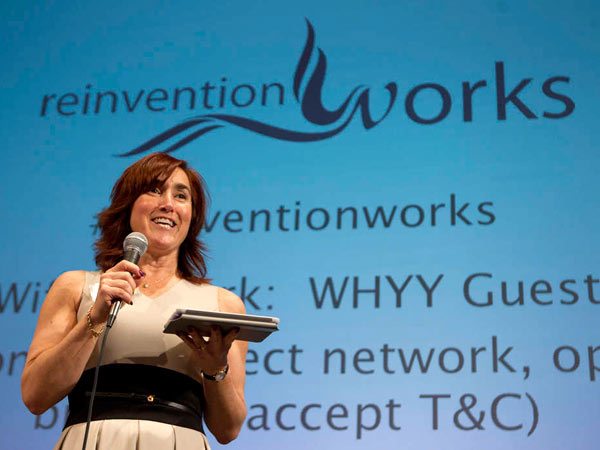By Jane M. Von Bergen
The Philadelphia Inquirer.
Always, after past recessions, Hollis Thomases managed to resurrect her marketing business, but this time, she just didn’t have the energy “to get back on the horse.”
And truthfully, that stallion had turned into a nag, and not much fun to ride.
So, instead, Thomases, 50, decided to reinvent herself — as a reinvention specialist, launching a business to work with people who want to change their lives or already have.
“I’ve reinvented myself more than once,” Thomases said.
Maybe the three dozen people who attended a program developed by Thomases didn’t realize it, but they were helping Thomases test her reinvention.
At “Reinvention Works After 45,” held Wednesday at WHYY in Center City, they networked. They traded inspiration and support and heard panelists talk about their reinventions — triumphs, maxing out credit cards, going from having enough money to own a BMW to having so little that a newspaper subscription broke the budget.
Wednesday’s panel included Steve Grasse, 50, an advertising agency executive reinvented as a manufacturer of spirits, and Lynn Bardowski, 53, a corporate saleswoman whose new network business sells candles at house parties.
Also speaking was former DuPont material sciences engineer Ronald Kander, 56, reinvented as an academician and dean of Philadelphia University’s engineering and design college.
In the audience were people like Rhona Gerber, an event planner whose business dissolved after 17 years. “I’m trying to figure out what I want to do when I grow up,” she said.
Necessity may force reinvention on Jeffrey Banet, who is about to become unemployed.
He specializes in selling alcohol. Should his next step be as an employee, or should he become an entrepreneur again? Should it be inside sales or a new business as outside sales organization for the area’s small breweries?
The people who are most successful with reinvention are those who take the time to reflect, both inwardly and outwardly, panelist Michael March said.
The outward makes common sense, researching potential customers, industry trends, and the competitive landscape.
But inward reflection is the first step, said March, of York, a management consultant and partner in the Clark Leadership Group.
When he coaches reinventors, he asks them to start by figuring out “what they are wired to do.” A reinvention that leads to something that is diametrically opposed to someone’s temperament will likely fail, he said.
Reinventors, March said, need to ask themselves questions like “What makes this the right time to begin my reinvention journey?” and “Am I willing to leave some of my history and worldview behind and fill that space with new thoughts, feelings, and actions?”
Also important, he said, is “to become aware of the amount of risk you are comfortable with,” financially and emotionally. The financial risk is obvious, but less understood is the risk to one’s psychological health coping with uncertainty or downturns.
“It really takes incredible optimism,” said Kander, the engineer-turned-dean. As corny as it sounds, optimism can help people view setbacks as learning experiences essential to future success.
Thomases said her research had shown five situations leading to reinvention, including unemployment, underemployment, and job dissatisfaction.
“Pre-tirement,” Thomases added. “Ten thousand baby boomers will turn 65 daily. Maybe they are ready to leave their [jobs], but it doesn’t mean they want to stop working.”
The fifth is “an abrupt life change,” she said, listing relocation of a spouse, an unexpected death, the loss of a relationship, and a near-death experience.
One under-discussed aspect of reinvention, Thomases said, is loss.
“I haven’t found a single reinvention story that reads like Cinderella, and honestly, the Cinderella story isn’t all that cheerful,” she said. “Everybody’s story has some grief in it.”
“There is a proven high correlation between entrepreneurs and depression,” she said. “Reinventing yourself will put you through the emotional wringer and will test your limits.”
Support from friends, family, and fellow reinventors is key, Thomases said. It’s part of what she hopes to accomplish through her new business venture.
By Thursday, Thomases had analyzed the post-event surveys.
“I got a lot of positive validation,” she said. “People said they were attracted by the term itself, reinvention.
“A lot of the people said they felt they were not alone. It was comforting to meet other people leading this same kind of journey.”
STEVE GRASSE
Home: Society Hill.
Past life: Founder, president of Gyro Worldwide, an ad agency.
Why he pivoted: “Having clients was a royal pain in the . . ..”
Reinvention: Founder, president of Quaker City Merchantile, a spirits manufacturing and consulting company.
Products: Started with Sailor Jerry Rum, Spodee fortified wine; Hendrick’s Gin.
Pro tip: Don’t talk about your reinvention, just do it.
When times are tough: Continually tweak your approach. Don’t bet the farm on one thing.
LYNN BARDOWSKI
Home: Audubon, N.J.
Past life: Business-to- business sales, business and office forms.
Why pivot: An unsympathetic boss.
Reinvention: Direct-sales firm sells candles, home decor at home parties via PartyLite.
Also: Million Dollar Party Girl offering entrepreneurial advice, especially to women.
Tough spot: After nearing $1 million in sales, firm nearly collapsed when key salespeople left. “It wasn’t just a pity party. It was my pity festival.”
Insight: Family, friends may not back your dream “until you make money. I told my hairdresser. She couldn’t have been more supportive.”














































































































































































































































































































































































